Sarah Sundin's Blog, page 494
December 19, 2011
Christmas in World War II - The Home Front
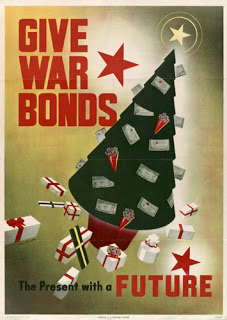 Although World War II did not take a holiday, Americans at home and abroad did their best to celebrate Christmas. Wartime separations and deprivations made festivities poignant and bittersweet. Last week's post looked at Christmas for American servicemen and women, and this week's looks at Christmas on the Home Front.
Although World War II did not take a holiday, Americans at home and abroad did their best to celebrate Christmas. Wartime separations and deprivations made festivities poignant and bittersweet. Last week's post looked at Christmas for American servicemen and women, and this week's looks at Christmas on the Home Front.Families on the Home Front dealt with painful separations as sons and daughters, husbands and fathers were away from home in the service. The holiday season highlighted this pain. Those left at home wanted to make Christmas festive, especially for the children.
 Gift giving presented unique challenges during World War II. While wartime income was high, few products were available on the shelves. Many consumer items weren't manufactured due to shortages of raw materials and conversions of factories for military use. Clothing wasn't rationed in the United States, but restrictions did apply and people were encouraged to make do with less. By 1944, a severe paper shortage even reduced the supply of books.
Gift giving presented unique challenges during World War II. While wartime income was high, few products were available on the shelves. Many consumer items weren't manufactured due to shortages of raw materials and conversions of factories for military use. Clothing wasn't rationed in the United States, but restrictions did apply and people were encouraged to make do with less. By 1944, a severe paper shortage even reduced the supply of books. Hardest of all were the scarcities of toys for the children. Toys with metal or rubber parts weren't available. Manufacturers switched to wood and cardboard and to the new plastics that were coming out. Popular wartime toys included dolls, wooden jeeps and airplanes, and "Bild-A-Sets," which allowed children to construct cardboard play-sets, often with military themes.
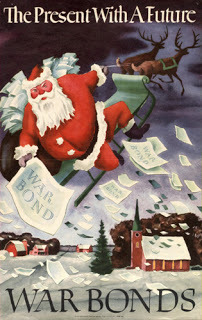 The US government provided a solution to the gift dilemma and encouraged the purchase of war bonds for Christmas presents.
The US government provided a solution to the gift dilemma and encouraged the purchase of war bonds for Christmas presents.Christmas dinners weren't quite as elaborate as before the war. Rationing of sugar and butter meant fewer sweets. Meat, including ham, was rationed. Although turkey wasn't rationed, the armed services worked hard to provide turkey dinners to the servicemen overseas, which meant fewer turkeys on the Home Front.
The holiday tradition of traveling to visit family and friends had to be curtailed during the war. Gasoline was rationed, and civilians were discouraged from train travel to free the rail system for movement of troops and supplies.Outdoor Christmas lights were one of the first wartime casualties. In Antioch, California, for example, outdoor Christmas lights were turned off on December 11, 1941, and the tradition of lighting the community Christmas tree was postponed for the duration. Blackout conditions on the coasts, and later a nationwide dim-out to conserve fuel meant Christmas might be merry—but not quite as bright.
Christmas in World War II left a lasting musical legacy. Bing Crosby's recording of "White Christmas" topped the charts in December 1942, and has since sold over 50 million copies, making it one of the biggest hits of all time. "I'll Be Home for Christmas" was the big hit for Christmas 1943, and Judy Garland's "Have Yourself a Merry Little Christmas" was in the Top Ten in 1944. These songs share a soft melancholy, a nostalgia for home, a wistfulness for tradition, and an optimistic hope for the future that resonated in wartime and still resonates today.
Celebrating Christmas in World War II required ingenuity and flexibility, but Americans at home and abroad set aside their troubles to commemorate Christ's birth.
Published on December 19, 2011 05:00
Today in World War II History
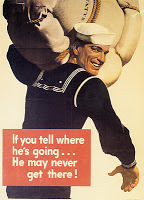 70 Years Ago—Dec. 19, 1941: Field Marshal Walther von Brauchitsch resigns as Commander in Chief of German army; Hitler takes his place. US forms Office of Censorship.
70 Years Ago—Dec. 19, 1941: Field Marshal Walther von Brauchitsch resigns as Commander in Chief of German army; Hitler takes his place. US forms Office of Censorship.
Published on December 19, 2011 03:00
December 18, 2011
Today in World War II History
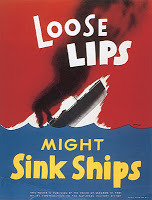 70 Years Ago—Dec. 18, 1941: Japanese land on Hong Kong Island. Congress passes First War Powers Act, giving president power to reorganize governmental agencies, and authorizing censorship of mail and communications.
70 Years Ago—Dec. 18, 1941: Japanese land on Hong Kong Island. Congress passes First War Powers Act, giving president power to reorganize governmental agencies, and authorizing censorship of mail and communications.
Published on December 18, 2011 03:00
December 17, 2011
Today in World War II History
70 Years Ago—Dec. 17, 1941: Due to Pearl Harbor attack, Rear Adm. Husband Kimmel is removed as Commander in Chief, Pacific Fleet and replaced by Adm. Chester Nimitz.
Published on December 17, 2011 03:00
December 16, 2011
Today in World War II History
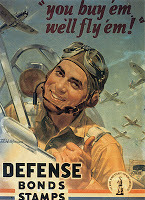 70 Years Ago—Dec. 16, 1941: Japanese land in British Borneo. In Philippines, Lt. Boyd Wagner becomes the first US Army Air Force ace in World War II.
70 Years Ago—Dec. 16, 1941: Japanese land in British Borneo. In Philippines, Lt. Boyd Wagner becomes the first US Army Air Force ace in World War II.
Published on December 16, 2011 03:00
December 15, 2011
The Advent Wreath - Hark! the Herald Angels Sing
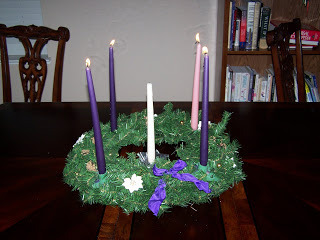 One of my family's favorite Christmas traditions is the Advent wreath. On each of the four Sundays in Advent (the four weeks before Christmas), our family gathers around the wreath with cookies and eggnog and hot chocolate. Not only is this cozy family time, but it focuses us with joyful anticipation on the birth of Jesus.
One of my family's favorite Christmas traditions is the Advent wreath. On each of the four Sundays in Advent (the four weeks before Christmas), our family gathers around the wreath with cookies and eggnog and hot chocolate. Not only is this cozy family time, but it focuses us with joyful anticipation on the birth of Jesus.This Sunday, December 18, is the fourth Sunday in Advent, but it's never too late to participate. If you'd like to join the Sundin family in this tradition, here are some family friendly, kid-tested ideas. Adjust these to the ages of any children present to create a meaningful time for your family.
Advent Week Four - The Angels' Candle
Candles:
Light two purple candles (the Prophets' Candle and the Bethlehem Candle), the pink candle (the Shepherd's Candle), and the last purple candle (the Angels' Candle). The purple symbolizes penance. Traditionally, the father lights the candles.
Story:
Explain how God sent His angels as messengers to tell Mary she would give birth to the Messiah, to reassure Joseph, to announce the birth to the shepherds, and to warn Joseph of Herod's plot.
Scriptures:
Luke 1:26-38 (how an angel told Mary she would give birth to the Messiah)
Matthew 1:18-25 (how an angel told Joseph that Jesus was the Messiah)
Luke 2:8-14 (how a host of angels announced Jesus' birth to the shepherds)
Matthew 2:13-15 (how an angel warned Joseph of Herod's plot and told him to escape to Egypt)
Matthew 2:19-21 (how an angel told Joseph when it was safe to return to Israel)
Songs:
"Hark! the Herald Angels Sing"
"Angels We Have Heard on High"
"It Came upon a Midnight Clear"
"Angels from the Realms of Glory"
Let's all bring glory to the newborn king this Christmas!
Published on December 15, 2011 05:00
Today in World War II History
70 Years Ago—Dec. 15, 1941: With Germans in retreat, the Soviet government returns to Moscow. American Federation of Labor adopts no-strike policy in war industries. Many US universities cut undergraduate programs to three years by going year-round.
Published on December 15, 2011 03:00
December 14, 2011
Today in World War II History
70 Years Ago—Dec. 14, 1941: British carrier HMS Audacity successfully keeps U-boat wolf-pack away from convoy HX-76 before being sunk by U-751, forcing German navy to rethink tactics. US armed forces extend term of service for enlistments to "duration plus six months."
Published on December 14, 2011 03:00
December 13, 2011
Today in World War II History
70 Years Ago—Dec. 13, 1941: Japanese air raid virtually destroys US air strength in Philippines. British attack Rommel's Gazala line in Libya.
Published on December 13, 2011 03:00
December 12, 2011
Christmas in World War II - The Military
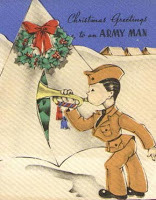 Although World War II did not take a holiday, Americans at home and abroad did their best to celebrate Christmas. Wartime separations and deprivations made festivities poignant and bittersweet. This week's post looks at Christmas for American servicemen and women, and next week's will look at Christmas on the Home Front.
Although World War II did not take a holiday, Americans at home and abroad did their best to celebrate Christmas. Wartime separations and deprivations made festivities poignant and bittersweet. This week's post looks at Christmas for American servicemen and women, and next week's will look at Christmas on the Home Front.Christmas during World War II found Americans on many fronts. In 1941, only a few weeks after the Pearl Harbor attack, American soldiers were putting up a fighting retreat in the Philippines. 1942 found soldiers fighting on Guadalcanal and New Guinea, and in Tunisia. In 1943, US forces fought on Bougainville, New Britain, New Guinea, and in Italy. Christmas of 1944 found the Allies reeling from the Battle of the Bulge in Belgium and also in France, and also engaged in northern Italy, and back in the Philippines. Throughout the war, sailors faced attacks at sea. In addition, many servicemen and women were stationed far from home even if not on the front lines.
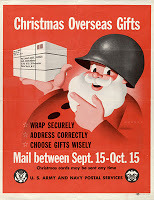 Nothing warmed the heart more than gifts from home. The Army and Navy post offices did their best to distribute presents quickly, but the sheer volume of mail and the great distances created difficulties. Families were advised to mail Christmas packages from September 15 to October 15, and the Navy restricted packages to under five pounds. Still, many servicemen, especially sailors at sea, received packages several months later. While many gifts were cherished and useful (such as candy, cookies, and warm socks), some were perplexing, such as neckties and cologne.
Nothing warmed the heart more than gifts from home. The Army and Navy post offices did their best to distribute presents quickly, but the sheer volume of mail and the great distances created difficulties. Families were advised to mail Christmas packages from September 15 to October 15, and the Navy restricted packages to under five pounds. Still, many servicemen, especially sailors at sea, received packages several months later. While many gifts were cherished and useful (such as candy, cookies, and warm socks), some were perplexing, such as neckties and cologne.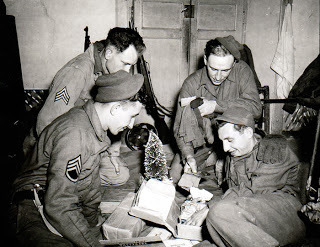 The armed services went out of their way to provide special holiday meals whenever possible. Those serving on ships or on fixed bases, either at home or abroad, had elaborate meals of turkey and ham with all the fixings. Even on the front lines, kitchens tried to provide turkey dinners. However, in 1942 on Guadalcanal, the troops were happy simply to receive an orange and a warm beer.
The armed services went out of their way to provide special holiday meals whenever possible. Those serving on ships or on fixed bases, either at home or abroad, had elaborate meals of turkey and ham with all the fixings. Even on the front lines, kitchens tried to provide turkey dinners. However, in 1942 on Guadalcanal, the troops were happy simply to receive an orange and a warm beer.Traditional decorations were scarce, but improvisation and creativity reigned. On the hospital wards overseas, nurses snipped tin from used plasma cans to make stars to string from the tent ceilings or to decorate little trees. Ration tins and foil wrappings were used for other makeshift decorations.
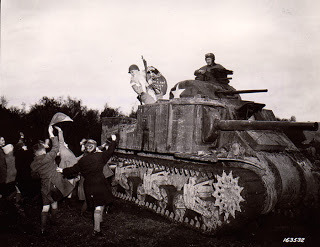 Many bases arranged Santa visits, concerts, and parties for the men. In addition, Americans often put together parties for local children. For example, the airmen of the 94th Bombardment Group stationed in Bury St. Edmunds threw a big party for British orphans.
Many bases arranged Santa visits, concerts, and parties for the men. In addition, Americans often put together parties for local children. For example, the airmen of the 94th Bombardment Group stationed in Bury St. Edmunds threw a big party for British orphans.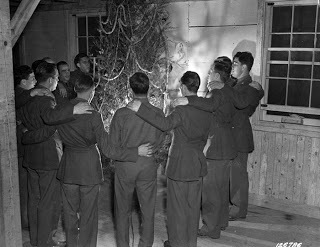 Most of all, the perilous times reminded the serviceman and woman of the reason for Christmas, the birth of Jesus Christ, who saves us from our sins and will one day usher in a new heaven and a new earth without hate and death. Christmas services were held on all fronts, and the carols about "peace on earth, goodwill to men" were sung with special fervor.
Most of all, the perilous times reminded the serviceman and woman of the reason for Christmas, the birth of Jesus Christ, who saves us from our sins and will one day usher in a new heaven and a new earth without hate and death. Christmas services were held on all fronts, and the carols about "peace on earth, goodwill to men" were sung with special fervor.Being separated from family and friends during the holidays made war that much more difficult for those in the military, but creativity and generosity made Christmas meaningful and memorable.
Published on December 12, 2011 05:00



